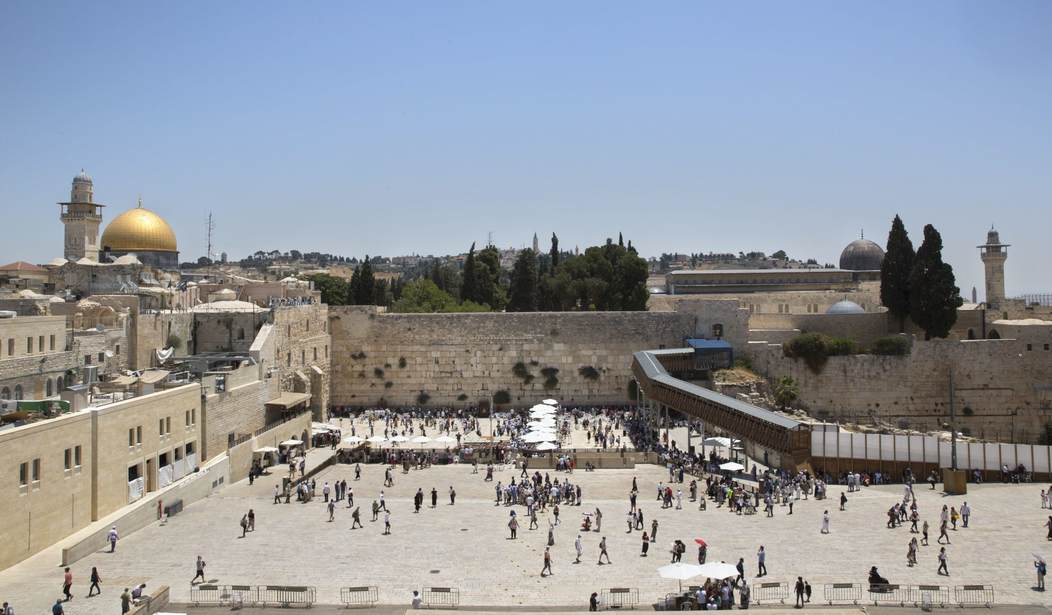WASHINGTON – While expressing frustration over President Trump’s delay in moving the U.S. Embassy in Israel from Tel Aviv to Jerusalem, a prominent Israeli attorney said Monday that even if the president fulfills his campaign promise, it won’t change the fact that the holy city is as divided as ever.
“Not only did President Trump not move the embassy as he promised, he came and went, left Jerusalem and stayed on script. Unheard of, but it happened and did not change longstanding American policy on this,” Danny Seidemann, founder and director of Terrestrial Jerusalem, said at the Wilson Center during the conflict discussion with a former Palestinian negotiator and a former U.S. Embassy official.
Trump during his presidential campaign promised to move the embassy to Jerusalem, calling it “the eternal capital of the Jewish people.” Earlier this month, the president signed a waiver under the Jerusalem Embassy Act to delay the move from Tel Aviv. The White House in a statement said that the delay would “maximize” the chances of successfully negotiating a peace deal between Israel and the Palestinian Authority, a prospect that Trump says is now a focus for his administration.
“The question is not if that move happens, but only when,” the White House said in a June 1 statement.
Seidemann said that Jerusalem is more contested today than at any other point since 1967, when the city became a binational territory. That year the city was about 25 percent Palestinian, Seidemann said, noting that the population has grown to 37 percent today.
The panel — which also included Ghaith al-Omari, a former adviser to the Palestinian negotiating team, and Arthur Hughes, former deputy chief of mission at the U.S. Embassy in Israel – discussed the potential for a two-state solution. Seidemann said that possibility is alive and well but only if the two sides are able to flesh out an existing border that runs through Jerusalem. Israel, he said, also must be willing to relocate about 156,000 settlers, which has ballooned from 116,000 settlers since Israeli Prime Minister Benjamin Netanyahu took office.
“Occupation ends in one way. Occupation ends in a border, and that border will be in Jerusalem. And there is absolutely no indication of that happening in the near future,” Seidemann said.
Al-Omari said the real problem is sovereignty over Jerusalem, which is a code word for “attachment.” He said the debate between the two sides over sovereignty has led to some of the most “infantile conversations” he has ever witnessed. He described an Israeli official, who he declined to name but said he has a lot of respect for, arguing in talks that Israel “clearly loves” Jerusalem more than the Palestinians. The official noted the numerous times the city is mentioned in the Torah. A Palestinian official’s response was that while Jerusalem is only mentioned a few times in the Quran, it’s only one of three cities mentioned in the ancient text, so they must love the city more.
“When it comes to attachment, it’s impossible to come up with some kind of rational, realistic approach in the territorial aspect,” Al-Omari said. He added that he doesn’t envision the Palestinian Authority accepting a two-state solution unless there is division of sovereignty in Jerusalem.
Seidemann said that neither side can be “bludgeoned” into giving up certain areas of the city, to which Hughes agreed. Hughes said he believes the city can be divided, and there is potential for progress on peace talks, but the ultimate hang-up is control over the Old City in Jerusalem and its holy sites, most notably Temple Mount, or Haram al-Sharif, as it’s known to Muslims.
If a deal is stalled by disputes over the Old City, Hughes offered a proposal that he has been helping develop at the University of Windsor’s Jerusalem Old City Initiative. The initiative proposes implementation of a special regime to govern the Old City. Through a two-state treaty, the suggestion is to develop a board that would appoint a chief administrator to govern the area on a day-to-day basis. The board, Hughes said, could be composed of Israelis and Palestinians, as well as officials from Jordan, Morocco or any other state that the two parties agree on. The proposal also suggests a religious counsel to provide guidance and a special police service made up of unarmed liaison officers.
“Asserting sovereignty by force of arms is not an option because it won’t lead to peace,” Hughes said.








Join the conversation as a VIP Member